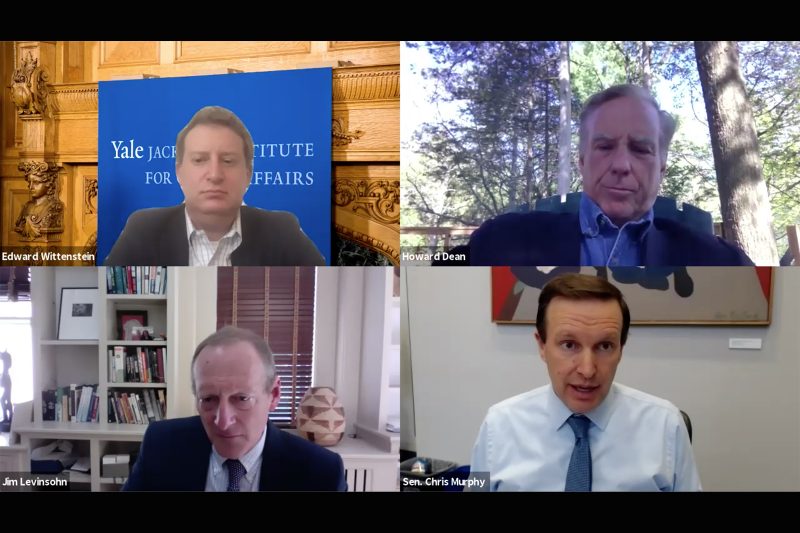U.S. Sen. Chris Murphy was the featured speaker for the May 20 Jackson Virtual Discussion Forum.
More than 200 attendees tuned in for the May 20 Jackson Virtual Discussion Forum, “COVID-19 and Global Affairs: A View from the U.S. Senate,” featuring U.S. Sen. Chris Murphy. Gov. Howard Dean, a Jackson Senior Fellow, served as the moderator.
The wide-ranging conversation, part of Jackson’s Virtual Discussion Forum series on COVID-19 and Global Affairs, touched on a variety of domestic and foreign policy issues in the wake of the COVID-19 pandemic.
When asked to reflect on his vision for the U.S. five years out, Murphy asserted that pandemics, a warming climate, and violence by stateless actors were the greatest threats facing the nation, not conventional military threats. “We are totally resourced for a world that doesn’t exist anymore,” Murphy said, citing the U.S. military’s huge budget versus the relatively small amount of funding earmarked for global public health.
“This crisis is exposing massive vulnerabilities,” Murphy said, including a dependence on China in the supply chain.
The pandemic is “an invitation to set up new capacities and to strengthen our alliances,” Murphy added.
When asked to comment on how U.S. foreign policy impacts the everyday lives of Americans impacted by COVID-19, Murphy drew a direct connection between U.S. foreign policy and better outcomes on the home front.
“What if we had decided to spend $100 billion rather than $10 billion on global public health? What if Trump hadn’t pulled out two-thirds of our CDC scientists from China? What if he hadn’t shuttered the PREDICT Program, which sends scientists and experts all around the world to discover pathogens just like COVID-19 early on, so that we could learn more about them, develop treatments and vaccines?” Murphy said.
“A smarter foreign policy might have prevented us at least from being in the depths of the crisis as we are today,” he said.
Murphy and Dean also discussed major changes that may come in the wake of the pandemic, including significant investment in green energy infrastructure, changes to the airline industry, improvements in broadband access, and a move to a hybrid model for education that includes both in-person teaching and distance learning.
